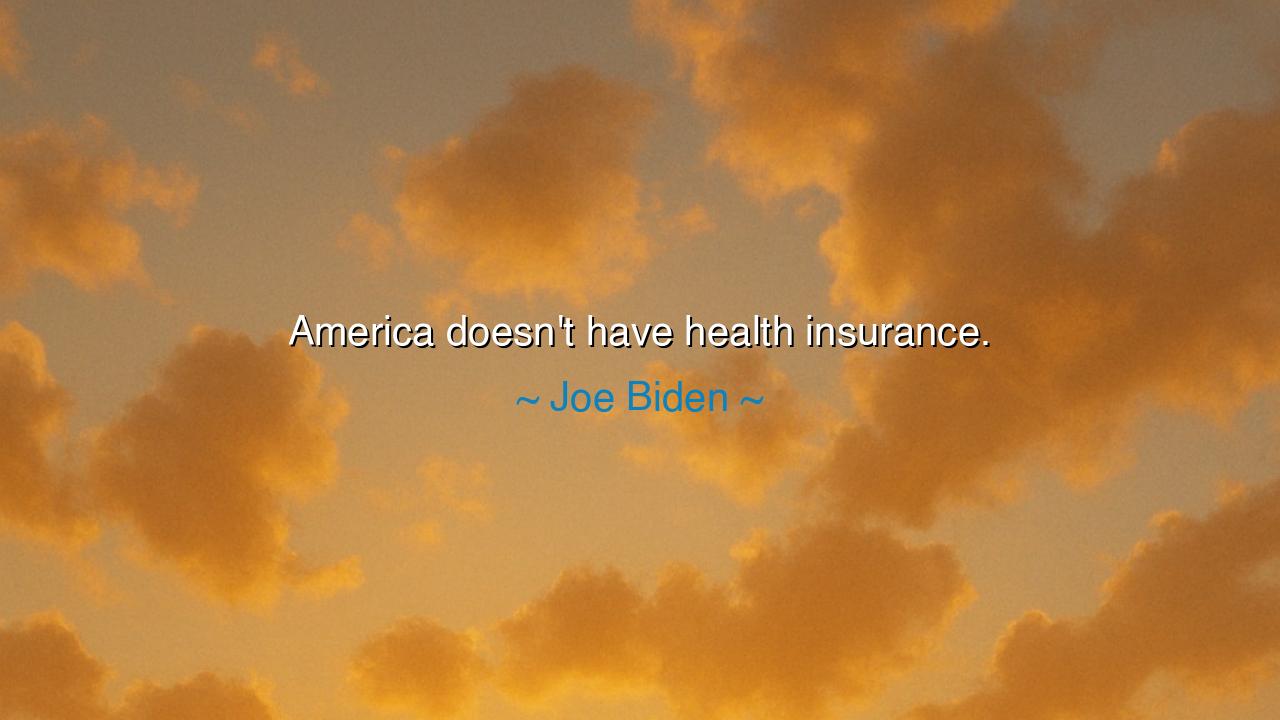
America doesn't have health insurance.






The statesman Joe Biden, with the weary clarity of one who has seen both triumph and tragedy, once declared: “America doesn’t have health insurance.” In these few words lies a truth far larger than the phrase itself. It is not merely a statement about policy—it is a lament for the soul of a nation, a reflection on compassion, and a challenge to conscience. His words call out not to politicians alone, but to the heart of every citizen, asking: How can a nation be whole when its people are left to suffer without care?
In the ancient days, the healers were regarded as sacred servants of life. The physicians of Greece followed Hippocrates, who swore to serve not wealth but the welfare of the sick. In the temples of Egypt, healing was an act of devotion to the gods. Even in the tribes of early peoples, medicine was shared freely among kin and stranger alike, for to withhold healing was to defy the divine order. Yet in the modern world—rich beyond the dreams of empires—the care of the body has become a commodity, bought and sold as if life itself were a contract. Biden’s words expose this wound: that America, for all her power and promise, has not yet made health a right, but a privilege.
When he said that “America doesn’t have health insurance,” he spoke not of the absence of policies or institutions, but of something deeper—the absence of universal protection. Millions go without the assurance that, in sickness, they will not lose home, work, or dignity. It is as if a fortress mighty in armies and wealth has forgotten to guard the most vulnerable within its walls. His statement pierces through the noise of debate to reveal a moral truth: a nation that cannot care for the health of its people is not yet fully whole.
Consider the story of Clara Barton, who, in the chaos of the Civil War, tended to the wounded on the battlefield without thought of payment or politics. She founded the American Red Cross, believing that compassion must be organized, that mercy must have structure. Her vision was not merely to treat wounds, but to ensure that the care of one’s neighbor was a duty, not an act of charity. In her work, we see the living spirit of what Biden’s words imply—the belief that health is not a privilege of the few, but the inheritance of all. Yet even today, that inheritance remains unfinished, its promise incomplete.
The health of a nation is not measured by the wealth of its hospitals, but by the wellbeing of its people. When Biden speaks, his tone carries the grief of one who knows suffering firsthand—a father who buried his son, a man who spent long nights in hospital corridors, praying for mercy. He speaks from that ancient place where love and duty meet—the recognition that health is not a luxury, but a foundation upon which all other freedoms rest. For how can a person pursue happiness when pain rules the body? How can liberty be enjoyed by one too ill to stand?
Biden’s statement also warns us of the danger of complacency. A nation may advance in technology, its cities may gleam with wealth, yet if its people are left to despair in sickness, the heart of that civilization grows hollow. The ancients would have called this imbalance—a corruption of justice itself. True strength is not found in the might of armies or the height of towers, but in the quiet dignity of a people who care for one another. When one citizen suffers alone, the whole nation falters; when one is healed, all rise together.
So let the lesson of this quote be a call to remembrance and action. Let each citizen see in another’s suffering the reflection of their own fragility. Support the systems that bring healthcare to the poor, the sick, the forgotten. Speak not only of freedom, but of responsibility—the sacred duty to care for those who cannot care for themselves. Advocate for fairness, for access, for compassion woven into law. For the measure of a civilization is not how it treats its strongest, but how it guards its weakest.
And thus, from the heart of Joe Biden’s words, a timeless truth emerges: that the body of a nation, like the body of a man, survives only when all its parts are tended. Health is not a privilege; it is the breath of life, the foundation of hope. To heal one person is to heal a fragment of the world. And until every American is assured of care—not through charity, but through justice—America herself shall remain unwell, yearning for the wholeness that compassion alone can restore.






AAdministratorAdministrator
Welcome, honored guests. Please leave a comment, we will respond soon